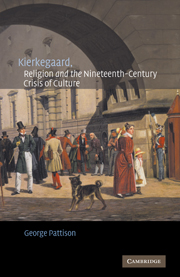Book contents
- Frontmatter
- Contents
- Preface
- Acknowledgements
- List of abbreviations
- 1 The sublime, the city and the present age
- 2 Kierkegaard and the world of the feuilletons
- 3 The present age: the age of the city
- 4 ‘Cosmopolitan faces’
- 5 Food for thought
- 6 A literary scandal
- 7 The reception of Either/Or
- 8 New Year's Day
- 9 Kierkegaard and the nineteenth century (1) Manet
- 10 Kierkegaard and the nineteenth century (2) Dostoevsky
- 11 Learning to read the signs of the times
- Bibliography
- Index
3 - The present age: the age of the city
Published online by Cambridge University Press: 22 September 2009
- Frontmatter
- Contents
- Preface
- Acknowledgements
- List of abbreviations
- 1 The sublime, the city and the present age
- 2 Kierkegaard and the world of the feuilletons
- 3 The present age: the age of the city
- 4 ‘Cosmopolitan faces’
- 5 Food for thought
- 6 A literary scandal
- 7 The reception of Either/Or
- 8 New Year's Day
- 9 Kierkegaard and the nineteenth century (1) Manet
- 10 Kierkegaard and the nineteenth century (2) Dostoevsky
- 11 Learning to read the signs of the times
- Bibliography
- Index
Summary
At several points I have touched on Kierkegaard's study A Literary Review: Two Ages, in which he pays tribute to the life-view of the popular novelist Mme Gyllembourg, especially as represented in the novel Two Ages. Here, as in his début work From the Papers of One Still Living, Kierkegaard sees in Mme Gyllembourg a telling counterweight to the insidious undermining of everything good, true and beautiful by the spirit of reflection as that is manifested in the literary, philosophical and political left. I have also alluded to the fact that the two works in which Mme Gyllembourg is discussed at length effectively frame the early aesthetic authorship, a point that is all the more significant in that it is precisely her qualities of dependability and consistency over the years that are central to Kierkegaard's admiration for her – in contrast to the utter absorption of the cultural innovators in the moment and in ‘what the age requires’: a slogan in which time itself in its most empty, ephemeral flux is made the sole unruly and chaotic measureless measure of life. It is therefore far from coincidental that Kierkegaard uses the discussion of Mme Gyllembourg and of a novel that contrasts the present age of the 1840s with the revolutionary period of the 1790s to offer his most sustained critique of ‘the present age’, Nutiden: the time-that-now-is-in-the-moment-of-its-passing, time itself.
Surprisingly, very little attention has been paid in the secondary literature to Mme Gyllembourg's novel itself.
- Type
- Chapter
- Information
- Publisher: Cambridge University PressPrint publication year: 2002



